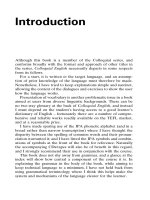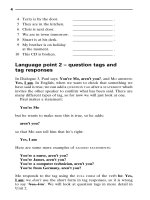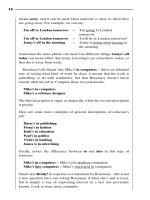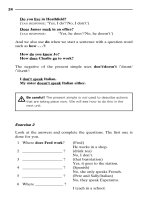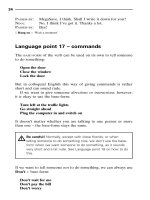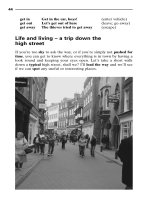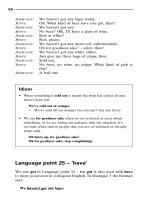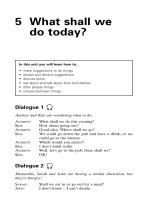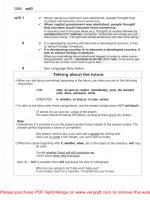Tài liệu A complete English language course part 14 pdf
Bạn đang xem bản rút gọn của tài liệu. Xem và tải ngay bản đầy đủ của tài liệu tại đây (129.57 KB, 10 trang )
4 Bert and Fiona are coming, and they’re (bringing/taking) the
kids.
5 (Bring/Take) those keys over to me.
6 The food’s already here – who’s (bringing/taking) the drinks?
7 Shall we (bring/take) some wine to the party?
8 Would you like me to (bring/take) you home?
9 I want you to (bring/take) these papers over to Henry.
10 Please (bring/take) your computer off my desk.
Exercise 9
We’ve seen ordinal numbers in some of the dialogues in this unit –
first (1st), second (2nd) and third (3rd) are irregular, but the others
are easy to recognise and end in -th. See if you can spot them in
this exercise. Listen to the audio of these different people telling
you their names and their birthdays. Then match the names to the
dates.
Liam 10 May
Sally 20 March
Adam 1 October
Edward 2 November
Monica 17 July
Keith 8 February
Anthea 7 December
Greg 22 September
Susan 10 November
Carl 17 June
Phrasal verbs
come up – when we say Something’s come up, we mean that something
unexpected has happened which will have an effect on our plans.
do up – ‘redecorate’. When we do things up, we improve them or make
them look better or newer. It doesn’t mean tidy up – if you say I’m
doing up the living room, you mean that you’re making permanent
changes to the room.
get together – ‘meet by arrangement’. We must get together soon means
‘We must arrange to meet soon’.
knock down – ‘demolish’, ‘destroy’. We use this phrasal verb mostly about
buildings – things which are standing and which fall down when they
are destroyed.
114
look up – when we look for a word in a dictionary, we say that we’re
looking the word up.
put down (for) – when you put someone down for a specific time, it means
that you make an appointment for them at that time: I’ll put you down
for ten o’clock.
start up – we sometimes use start up when we talk about starting engines
or other machinery; it means that we switch it on to make it start.
turn off – ‘switch off’ (Unit 6).
turn on – ‘switch on’ (Unit 6).
Life and living – seasons and weather
In Dialogue 3 we saw Hannah and Simon doing what a lot of people
do in Britain a lot of the time – talking about the weather!
Because of their geographical position on the north-western edge
of the continent of Europe, the British Isles experience a wide
variety of types of weather, with weather systems constantly
blowing in off the Atlantic and bringing meteorological conditions
that are not only changeable but often also dramatic. In addition,
there are four well-defined seasons, each with its own typical
weather patterns.
Winter is usually cold, especially in the north of England and in
Scotland, and you can expect snow, sometimes heavy, at any time
from December to February. Southern areas tend to get less snow,
sometimes none at all, but snow is very unpredictable and even the
south can wake up to a white landscape. Spring is characterised by
milder temperatures, windy weather and showers all over the
country, with more rain in the west than in the east generally.
Summer can be quite hot and sunny, especially in July and August,
with record temperatures during long spells of fine weather. At the
end of September the summer heat abates and autumn arrives, with
its misty weather and the changing colours of the leaves on the trees
signalling the approach of winter once more.
Of course, the day-to-day picture is much more complicated than
that in a country like Britain, and its probably not surprising that
we have a lot of weather words. Rain can come as showers, drizzle
or a downpour, for example; and snow can appear as flurries or a
blizzard or in drifts (and don’t forget hail and sleet!). One day you
can experience a heatwave, and the next day can be watching the
spectacle of a violent thunderstorm.
But whatever the weather when you’re in Britain, you’ll always
have something to talk about. And don’t forget your umbrella!
1111
2
3
4
5
6
7
8
9
10
11
1211
13
14
15
16
17
18
19
20
21
22
23
24
25
26
27
28
29
30
31
32
33
34
35
36
37
38
39
40
41
4211
115
Glossary
geographical position – where something is in the world
continent – large body of land, like Europe or Asia
British Isles – the main islands of Britain and Ireland, with all the outlying
small islands that belong to them
variety – different kinds
constantly – all the time, again and again
meteorological conditions – types of weather
changeable – likely to change a lot
dramatic – noticeable, impressive, surprising
well-defined – easy to distinguish, obviously different
patterns – a regular way in which something happens
tend to get – usually get
unpredictable – coming without warning
wake up to – see or find as soon as you wake up
landscape – what the land around you looks like
is characterised by – typically or usually has
milder – less cold
showers – short periods of rain
record temperatures – very high (or very low) temperatures
spells – periods
fine weather – sunny, calm weather
abates – goes down, gets less
misty – where there is a lot of mist (wet cloud at ground level)
signalling – giving a sign that something will happen
approach of winter – that winter is coming
drizzle – very light but steady rain
downpour – very heavy rain
flurries – light snow blowing in the wind
blizzard – heavy snowstorm
drifts – lying snow
hail – frozen rain
sleet – a mixture of rain and snow; wet snow
heatwave – a long period of very hot weather
spectacle – something you see that is strange or impressive
thunderstorm – an electrical storm with thunder and lightning
umbrella – something for protecting you from the rain
116
8 Can I make an
appointment?
In this unit you will learn:
• how to make appointments over the phone
• how to use ‘can’, ‘could’ and ‘should’
• how to use two verbs together
• more about state verbs
Dialogue 1
Gerry’s not feeling very well, so he phones the doctor’s surgery.
R
ECEPTIONIST
: Surgery. Good morning.
G
ERRY
: Good morning. Can I make an appointment to see
the doctor today?
R
ECEPTIONIST
: We’re very busy this morning, I’m afraid. May I ask
what the problem is?
G
ERRY
: I’ve got a bad cold. Do you think I could see one
of the doctors just for five minutes?
R
ECEPTIONIST
: Hold on a moment . . . yes, Dr Smith is free at ten
– will that do?
G
ERRY
: Great. Thanks a lot.
R
ECEPTIONIST
: Not at all. See you at ten.
G
ERRY
: Bye.
1111
2
3
4
5
6
7
8
9
10
11
1211
13
14
15
16
17
18
19
20
21
22
23
24
25
26
27
28
29
30
31
32
33
34
35
36
37
38
39
40
41
4211
Idioms
• hold on means ‘wait’
• Will that do? means ‘Is that convenient for you?’
Dialogue 2
Maria has also been to see the doctor. She’s prescribing her some
green tablets and some red ones.
M
ARIA
: Now, how often should I take these?
D
OCTOR
: I want you to take a green one each morning, and a
red one at night.
M
ARIA
: How long for?
D
OCTOR
: Keep taking them every day until you feel better, or
until you run out.
M
ARIA
: What if I run out and I still don’t feel any better?
D
OCTOR
: Then you’d better come back and see me.
Dialogue 3
Later, Maria gets home and Tony asks her how the visit to the
doctor’s went.
M
ARIA
: I’ve got some green pills and some red ones.
T
ONY
: When are you supposed to take them?
M
ARIA
: The red ones every morning, and the green ones . . .
oh, no, wait a minute . . . Is that right?
[Maria thinks for a moment]
No, I’m supposed to take these green ones in the
morning, and the red ones at night.
T
ONY
: Are you sure? You ought to check if you’re not. Why
don’t you phone the surgery and ask?
M
ARIA
: You’re right – I’d better phone and ask to speak to
the doctor again.
118

